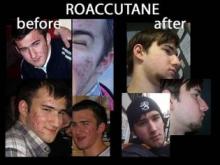The James Marshall Accutane trial has been highly anticipated – at least by some, including:
Rabid fans of the actor who at one time was dubbed “The next James Dean."
Lawyers hungry to cast more chum upon the churning Accutane waters.
And dermatologists, who must balance yet another risk/benefit ratio: being named in a multimillion dollar lawsuit vs. the benefit of isotretinoin to young people with disfiguring acne.
Marshall – who goes by his legal name James Greenblatt in the case filed in New Jersey Superior Court – was the free-wheeling biker in “Twin Peaks,” and Pfc. Louden Downey in the Academy Award-winning film “A Few Good Men.”
He used isotretinoin and developed an inflammatory bowel disease that required a colectomy. Mr. Greenblatt claimed this resulted in incontinence, derailing his acting career. The suit, scheduled to go to trial today, has an all-star cast of witnesses: Brian Denehy, Martin Sheen, and Rob Reiner.
When I called the court this morning to confirm the case, court administrator Rob Helsabeck told me it had been indefinitely adjourned. “No continuance date has been set,” he said. “I don’t know the details, but I heard that there is ongoing discussion between Roche and Mr. Greenblatt’s attorneys.”
Will Roche settle, sacrificing a few million to keep a high-profile case low-profile?
Or, perhaps science will prevail?
And that leads us to the science…
Accutane was practically birthed with a bad reputation. In 1982, it went to market with fewer than 100 cases under its clinical belt, Dr. Hilary Baldwin said at the summer meeting of the American Academy of Dermatology.
Its teratogenic dangers were already well-established, and the prescribing information made it abundantly clear that it could cause thalidomide-like birth defects. But it wasn’t long before — like an eighth-grade girl caught kissing in the bathroom – Accutane began to acquire a long list of horror stories.
Alopecia. Aggression. Violence. Depression. Suicide.
And, beginning in 1986, ulcerative colitis and Crohn’s disease. Subsequent reports led to a 1988 modification of the package insert, warning of a possible association with inflammatory bowel disorders, and urging patients to be on the lookout for GI pain, rectal bleeding, and diarrhea.
“In 2007, the lawyers got hold of this by the neck,” said Dr. Baldwin, a dermatologist in Brooklyn, N.Y. “Since then, more than 5,000 suits have been filed.
Seven of those have gone to trial, and Roche lost every one of them, with a total settlement amount of $45 million. Three, however, have been overturned on appeal – one just last week, with Roche recovering more than $10 million.
It’s a victory for the company to be sure, but 45 more cases are lined up in the New Jersey Superior Court case docket. One of Roche’s biggest legal handicaps, Dr. Baldwin said, is that it has been unable to fully tell its side of the story. “You certainly don’t want to make light of the poor young person who has developed this terrible disorder, and yes, it’s sad that someone would get IBD after treating their acne. But the jury only hears the numerator – they were never able to hear the denominator, that 18 million people have taken isotretinoin” and only a tiny minority developed IBD.
“The picture gets even cloudier when you consider that a time of peak onset for IBDs is 15-30 years – also the prime time for isotretinoin treatment,” she said.
Two clinical reviews, one conducted in 2006 and one in 2009, found no statistically significant association between the drug and either ulcerative colitis or inflammatory bowel disease. The 2006 case-control study found 85 cases of IBD concurrent with isotretinoin use – a rate of 14 per year. “Interestingly, the expected results from this age population would have been about 59 new cases per year, so you could look at it that isotretinoin was actually protective of developing IBD,” Dr. Baldwin said.
According to a probability scale used in the study, four cases (5%) scored in the “highly probable” range for isotretinoin as the cause of IBD, 58 cases (68%) were “probable,” 23 cases (27%) were “possible,” and no cases were “doubtful,” – a conclusion that would leave most doctors unconvinced of a direct causality.
Lawyers have a different interpretation. “Study confirms 100% of IBD cases may have been caused by Accutane,” trumpets the website of The Orlando firm, P.C., of Athens, Ga.
So who’s right?
The answer is still fuzzy, Dr. Baldwin said. Things looked pretty good for isotretinin through 2009, when a Canadian study looked at 12 years of data on 1 million Manitoba residents. There were no significant associations between the drug and the disease in the case-control analysis.



